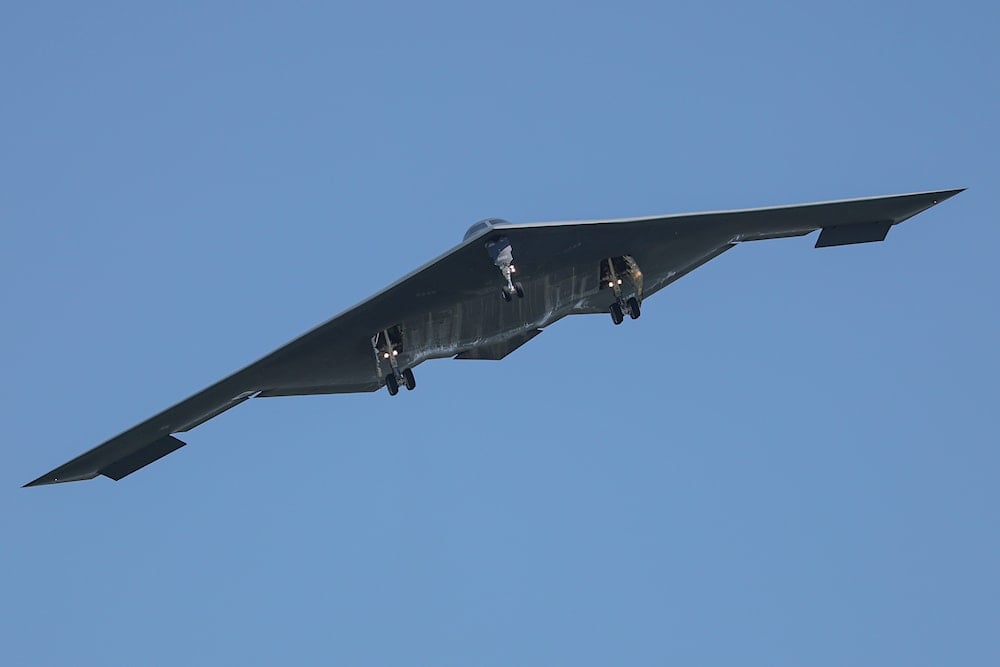US strikes on Iran’s nuclear sites spark leak probe
Following the US's attack on Iran's nuclear sites, conflicting reports emerge over the effectiveness of the US strikes, prompting Trump envoy Steve Witkoff to call for a leak investigation into the intelligence assessment.
-

A B-2 bomber arrives at Whiteman Air Force Base, Missouri, on June 22, 2025. (AP Photo/David Smith)
In its attacks on Iran on Sunday, the United States launched a military attack against Iran’s nuclear infrastructure, targeting the facilities at Fordow, Natanz, and Isfahan. The offensive involved dropping 12 GBU-57 Massive Ordnance Penetrators on Fordow and two on Natanz, along with more than two dozen Tomahawk missiles launched at Isfahan from a US submarine.
Chairman of the Joint Chiefs of Staff Gen. Dan Caine stated that initial assessments indicated the sites had "sustained extremely severe damage and destruction," according to Fox News. Defense Secretary Pete Hegseth echoed this view, asserting that the strikes had obliterated Iran’s ability to produce nuclear weapons, with massive bombs hitting "exactly the right spot."
However, CNN reported that a preliminary assessment from the Defense Intelligence Agency contradicted those claims.
According to sources familiar with the report, the strikes failed to destroy critical components of Iran’s nuclear program or eliminate its stockpile of highly enriched uranium, reportedly only setting back Iran’s program by months rather than years.
Moreover, Hegseth announced Wednesday morning that the Federal Bureau of Investigation has launched an investigation into how a draft intelligence report regarding US military strikes in Iran was leaked to the public.
“We’re doing a leak investigation with the FBI right now, because this information is for internal purposes,” said Hegseth, speaking to reporters Wednesday at the NATO summit in The Hague.
Witkoff demands accountability for treasonous leak
Special Envoy to the Middle East Steve Witkoff expressed outrage over the leak of the intelligence report. Speaking on Fox News' "The Ingraham Angle," Witkoff described the leak as "treasonous" and called for an investigation, warning that such disclosures could endanger lives. "It ought to be investigated, and whoever did it should be held accountable," he stated.
US President Donald Trump declared that the United States had "obliterated" Iran’s nuclear program, and Defense Secretary Hegseth emphasized that the impact was buried under "a mountain of rubble," dismissing any doubts about the mission’s success as attempts to undermine the President.
Witkoff backed these claims, stating the Isfahan conversion facility was "completely destroyed," and describing the underground and above-ground facilities at Natanz as "eviscerated," with "Israeli" strikes contributing to the damage.
A classified briefing for lawmakers on the operation’s results is scheduled for Thursday, as the debate continues over the effectiveness of the strikes and the implications of the intelligence leak.
On that note, satellite imagery indicates that reactors at the Isfahan Nuclear Technology and Research Center may have been deliberately spared, Bloomberg reported on Monday, adding that the facility, which includes three operational research reactors, remained undamaged according to the International Atomic Energy Agency (IAEA).
US officials stated that a full damage assessment will take time, but early analysis suggests deliberate efforts to avoid irradiating active reactor cores. Four senior officials in Vienna confirmed that the Isfahan reactors were not targeted, citing risks of a nuclear incident.

 3 Min Read
3 Min Read










